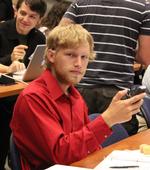Posted on Tuesday, October 2, 2012
NEW WILMINGTON, Pa. - Eleven Westminster College "Broadcast and Digital Journalism" students attended the 2012 Poynter Institute's Media Ethics Workshop Sept. 20 at Kent State University.
The theme "Dirty Politics" focused attention on the role of journalism as the watchdog of truth in the political campaigns underway. Panelists made up of journalists, nationally-recognized bloggers, political scientists and pollsters explored how social media has evolved into the fifth estate mirroring some of the watchdog duties of the media as the fourth estate.
Brad Weaver, communication studies lecturer and instructor of the course, said, "For me, the topic hits home as the discussion kept coming back to how politicians are now requiring "quote-approval" from journalists before stories go public. As a broadcast journalist since 1985, this trend in "access journalism" mirrors the ethical problems found in checkbook journalism - paying for access or interviews - and what I call "bigfoot journalism." I coined the term to express the problem of limiting access and information to notable news organizations and the big name journalists with celebrity status. "
The students participated in the discussion by asking the panelists questions in person as well as posting comments and feedback via Twitter during the workshop. Some students also networked with panelists seeking business cards and contact information for research on media ethics in the course.
"I learned that the ethical topics we talk about in class are also being discussed at the professional level," said Kyle Bruinooge, a junior broadcast communications major. "I was also able to talk to USA Today's Congress Correspondent Gregory Korte briefly and network with him for an upcoming podcast project I'm working on for class. I will be talking to him about pressures to publish stories before they are fact checked, just so a publisher can claim they broke the story."
"What I took away from the workshop is that to be successful at what you are doing, you must understand your moral compass," said Jarred Treshok, a junior broadcast communications major. "You will not get far in this business if you are lazy with your ethics. If you are unethical, people will not go to you for source information because you are known as unreliable. The ethical journalist will still get the story."
Treshok was one of the students who actively tweeted during the conference. His tweets and comments were featured prominently in the discussion and to the worldwide audience tuning in via the Internet.
"I was able to network through twitter and I actually had one of my tweets re-tweeted by one of the speakers. This was great to see. I now know that if I ever needed help or an interview, they are willing to help and easy to contact. I will use the research for my podcast project in class," Treshok said.
The "Broadcast and Digital Journalism" course builds on the fundamentals of broadcast and electronic news writing from previous courses including practical, ethical and legal considerations. Students learn and advance their skills in news gathering, interviewing, writing, producing, reporting and presenting content on Titan Radio, WCN and wcn247.com. The course engages study and exploration by students in all aspects of the newsroom operations including the convergence of the broadcast side of the newsroom to the online product.
Contact Weaver at (724) 946-7238 or email for additional information.

